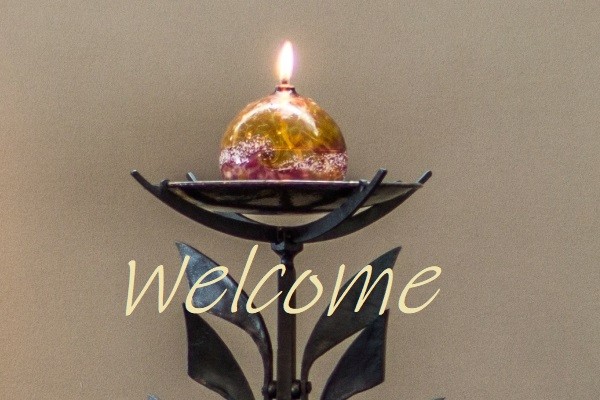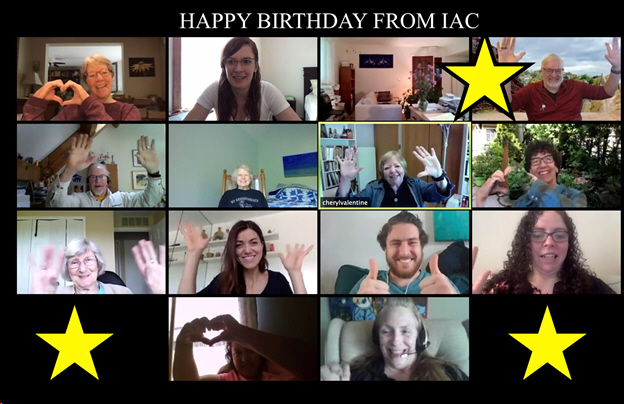WELCOME!
... To a faith with the power to transform lives and change the world. ... To a faith that can sustain and enrich the next chapter of your life.
Highlighted Events
CRT Talking Points
CRT Talking Points
The Racial Justice Arc has created a “Talking Points” resource for UUAA members who may find themselves wanting to engage with neighbors, acquaintances, or school board leaders faced with challenges to teaching historical truths in the classroom.
Themes covered include these: All are concerned about the emotional well being of children. An educated citizenry is necessary for the survival of our democracy and a free people. We need to know the whole truth of our history in order to function in an increasingly diverse workplace and society. Teachers deserve our support.
Talking Points for Advocacy on Teaching Historical Truths in K-12 Curriculums
Racial Justice Arc Action Group
September 2021
All are concerned about the emotional well being of children.
Considerable alarm surrounds what is referred to as Critical Race Theory (CRT). Some parents/people are afraid that information about race and racism will be integrated into the K-12 public school curriculum and that it will cause their children to feel demeaned, guilty, or even consider themselves a racist. Other parents/people are concerned that this same curriculum is whitewashed and that none of the children learn what really happened; the truth has not been told. Parents/people of children of color are angry that the curriculum in K-12 has neglected race and racism for a very long time and the result has hurt their children: they feel invisible, inferior, and marginalized. Each of these groups is afraid children are being emotionally hurt.
However, as Dr. Michael Rice, Michigan State Superintendent of Schools told the State Board of Education on August 10, 2021:
Race and racism may be inconvenient for some, uncomfortable for others, and searing for still others, but, because they are inextricably a part of our history, they must be taught. I have confidence in our teachers to work through and teach these challenging issues to share the fullness and complexity of our history with our children.
In a democracy, ours included, an educated citizenry is necessary for our survival as a free people. If we lived under an authoritarian government, citizens would follow the orders of a dictator. We would not need to choose among options. But, in a democracy, ideally, we talk together about the important choices before us and reach a decision together. In order to reach effective and enduring decisions, it is important to base them on reliable information. The truths of our history need to be shared with our children so they have the knowledge to make wise civic decisions, decisions that promote the common good of the community or the nation. If they do not have this knowledge, the democracy which surrounds us all- And protects such rights as free speech--will be eroded. The Founding Fathers felt education was so important, that they included the words which follow as part of the Northwest Ordinance of 1787: ". . . knowledge being necessary to good government and the happiness of mankind, schools and the means of education shall forever be encouraged."
Americans need to know the whole truth of our history in order to function in an increasingly diverse workplace and society. "In order to survive in this interconnected global village we must learn and learn very quickly to respect those who are different from us. . . .G. Lerner, 17.) The same is true for those who are members of different groups within American society. Everyone needs to know what really happened in our collective past. It is not enough to cherry-pick the laudatory and heroic parts of our history; we also need to know the discriminatory and brutal aspects of it. This way, we can learn from the mistakes and help create a more inclusive, just society whose members can work together to solve complex problems such as poverty and climate change. "It is history, the known and ordered past, that enables us to delineate goals and visions for a communal future (G. Lerner 128)." President Theodore Roosevelt put it this way: "The more you know about the past, the better you are prepared for the future, President Theodore Roosevelt."
Dr. Rice pointed to the U.S. Constitution and the Founding Father's vision to "form a more perfect union." He also pointed to "examples of historic actions to address racism and racial injustice, including the 13th amendment, which banned slavery, the 14th amendment, which granted citizenship to all people born or naturalized in the U.S., and the 15th amendment, which gave adult males the right to vote regardless of race."
Rice continued: "Children today need to know our rich, marbled history and to consider its layers, its contradictions, its complexities. We teach history so we can learn from it. So as not to relive the tragic moments and to help continue our inexorable progress as Americans to keep building a more perfect union."
Teachers deserve our support. Teachers are some of the most hardworking, unselfish, professional public servants in our society. They labor to prepare the next generation to manage their lives and to contribute to the well being of our nation. If they are being vigorously attacked by citizens or increasingly tightly constrained in what they are teaching, they can't focus on their jobs, especially the needs of their students. The quality of students' education-every student's education-- is being damaged. "What we teach children is to respect each other, honor each other and our history (Randi Weingarten, President of the American Federation of Teachers, July 6, 2021)." We need to support teachers.
Critical Race Theory- is a theory that university scholars use to explore race and racism in society and institutions. Its origin was in legal theory and the application of law, but it has also been used to investigate broadly in university level social science research.
Suggestion for talking with someone who opposes "CRT." SURJ Training 8/25/2021.
Many people have various ideas about what CRT means. In a dialogue, it can be helpful to start by finding out what the other person means by the term.
September 2021
Sources for Talking Points - CRT
Burr, Alyssa. This email address is being protected from spambots. You need JavaScript enabled to view it. 2021/08/10. Dr. Michael Rice to Michigan Board of Education.
Lerner, Gerda. Why History Matters. NY: Oxford, 1997, 17 & 128.
Northwest Ordinance of 1787, Wikipedia.
Perez, Juan. "Fight for Honesty in Education" in 'Weekly Education' in "Politico." 2021/07/06. Randi Weingarten, American Federation of Teachers.
Click here for a printable PDF version
Racial Justice Arc
The Racial Justice Arc (RJA) is an inclusive, affirming group where all are welcome. RJA is dedicated to pursuing racial justice and fighting oppressive cultural structures affecting people of color. Our work is driven by Unitarian Universalist Principles and is guided by UUAA’s 20/50 Visioning work. As the center of our UUAA anti-racism work, we will organize, implement, and delegate a variety of activities. We will act, learn, share authentically, and encourage each other to challenge white supremacy behaviors and cultural structures in the fight for racial justice. RJA will partner with groups internal and external to our congregation in order to increase our effectiveness and to amplify our collective voices.
UUAA's Racial Justice Arc (RJA) formed in September 2020 as a natural continuation of the Challenging Racism Group, whose work came to a close.
For more information or meeting dates, contact This email address is being protected from spambots. You need JavaScript enabled to view it.
Resources
The Racial Justice Arc has created resources to help UUAA congregants engage with anti-racism and anti-oppression.
View or download Some Actions UUs Can Take to Support Anti-racism
View or download Anti-Racism/Anti-Oppression Resources for Families
View or download some "Talking Points" on Critical Race Theory for UUAA members who find themselves wanting to engage with neighbors, acquaintances, or school board leaders faced with challenges to teaching historical truths about race history in the classroom. Themes covered include these: All are concerned about the emotional well being of children. An educated citizenry is necessary for the survival of our democracy and a free people. We need to know the whole truth of our history in order to function in an increasingly diverse workplace and society. Teachers deserve our support.
Letter to the Congregation About Racial Justice, 6/12/20
A Letter to the UUAA Congregation from President Erik Stalhandske, Senior Minister Rev. Manish Mishra-Marzetti and Social Justice/ Pastoral Care Coordinator Quiana Perkins

Dear Members and Friends of our Beloved Community:
It is with profound heartache that we recognize that our nation, and our broader world, is at an inflection point related to the pernicious harm of individual and systemic racism. Even as we recognize our unwavering Unitarian Universalist commitment to the intrinsic worth and dignity of each and every human being, we live in a culture in which life and death outcomes are unambiguously defined by race and class. There is profound pain and disappointment in facing this reality head-on: many of us Unitarian Universalists have been at the forefront of civil rights justice making, since the 1960s, if not even earlier. We recognize, in our heartache, that the dream of that civil rights movement was never fully realized, and that it is our collective responsibility to continue holding and pursuing that dream.
As we are also aware, the changes that are needed –to institutional systems, cultures, practices, and norms -cannot be brought about by communities of color, alone. Communities such as ours, which are predominantly white, must be at the forefront of working for the more just and equitable world we all need. Racism was not built in a moment. This is sustained, long haul work. This is work that must take place at every level of human society: nationally, locally, within our congregational community, and within our hearts, individually.
Amidst the uncertainty and pain of this moment, many are asking what can we do? How can I/we/my family engage? This is a natural human impulse: staring at injustice, goodhearted people want to make a positive difference. We support and affirm that impulse toward building the world we need, as has our congregation: UUAA’s visioning process has lifted up our collective commitment to racial justice as one of our congregation’s core priorities. And, statements and priorities need to be brought to life through collective action.UUAA will, in the year ahead, engage in community-level action planning in support of our shared vision, which includes our ongoing commitment to racial justice. While we move toward that, we invite you to additionally engage in the following ways:
- Consider reviewing this Medium.com article: https://medium.com/equality-includes-you/what-white-people-can-do-for-racial-justice-f2d18b0e0234. This article includes many concrete actions one can take in support of racial justice. We invite you to take some (or even many) of these recommended actions.
- Learn about Sha’Teina Grady El, who recently experienced police brutality at the hands of Washtenaw County deputies: https://www.mlive.com/news/ann-arbor/2020/06/charging-ypsilanti-woman-punched-by-police-serves-no-reasonable-useful-purpose-aclu-says.html.Consider learning more about this case (there are many publicly available news reports) and consider contacting Washtenaw County Sheriff Jerry Clayton on this matter.
- Justice making invites us to be in relationship with and take the lead from local, impacted communities of color. What relationships/friendships/connections might you personally have to local, Washtenaw County-based Black communities? Can you personally help build cross-2community relationships and friendships between those individuals and communities and UUAA? Relationship is how we discover what locally impacted communities need, and how best to stand in solidarity with them.
- Parents and primary caretakers of children, who are interested in integrating anti-racist paradigms into their parenting/caregiving,may wish to check out this resource, featuring UUAA’s very own Quiana Perkins: https://www.youtube.com/watch?v=xYHz3zyTdxM&feature=youtu.be&fbclid=IwAR0ouffeiu4y-2D-6keuKAXvOE21YO91UtdxpDnoZJfzaVNwCRcCi3SY3MI
- Parents, grandparents, and other caregivers may wish to watch the CNN-Sesame Street Kids’ Town Hall on Race jointly with the children in their lives. The full content is available here: https://www.cnn.com/2020/06/06/app-news-section/cnn-sesame-street-race-town-hall-app-june-6-2020-app/index.html
- Learn about and support Michigan State House Bill H5837, which supports law enforcement reform measures in our state: http://legislature.mi.gov/doc.aspx?2020-HB-5837. You can find out who your Michigan State House representative is here: https://www.house.mi.gov/mhrpublic/frmFindARep.aspx. Consider contacting your State House representative in support of this legislation.
- Learn about Michigan’s Joint Task Force on Jail and Pretrial Incarceration here: https://courts.michigan.gov/News-Events/Documents/final/Jails%20Task%20Force%20Final%20Report%20and%20Recommendations.pdf. Consider contacting your representatives in the Michigan State Legislature to express support for these recommendations. You can find your State House representative here: https://www.house.mi.gov/mhrpublic/frmFindARep.aspx. You can find your State Senate representative here: https://www.senate.michigan.gov/fysbyaddress.html.
We recognize that there is no single public statement, no single class/seminar, no single article, book, or video, no single protest or demonstration that is going to somehow dismantle generations of oppressive practices and structures. This work will take all of us working together consistently, over time.
We pledge our leadership to the long haul work that is needed, and invite you into that work with us.It will take all of us.Black Lives Matter -to each of us personally, to our families, and to our entire UUAA community.In love, faith, and solidarity in that shared commitment to justice,
Mr. Erik Stalhandske, President
Rev. Manish Mishra-Marzetti, Senior Minister
Ms. Quiana Perkins, Coordinator of Social Justice and Pastoral Care
June 12, 2020
Sanctuary - Frequently Asked Questions
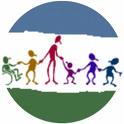
ON UUAA BECOMING A SANCTUARY CONGREGATION
1. What is sanctuary? Sanctuary is a safe space traditionally located within a faith community, school or hospital which is generally recognized as “off limits” by law enforcement agents. In a 2011 memo the Department of Homeland Security clarified its longstanding policy that Immigration enforcement activities including interviews, arrests, searches and surveillance should not occur in these “sensitive locations.”
2. What does it mean to be a sanctuary congregation? A sanctuary congregation is one that is: a) willing to publicly advocate for immigration justice and reform and b) willing to welcome an immigrant in danger of immediate detention and deportation into physical sanctuary within the church building for a period of time. UUAA members will vote on October 22 as to whether to become a host sanctuary congregation.
3. How does the New Sanctuary Movement differ from the 1980s sanctuary movement? In the 1980s many congregations of conscience, including our own UUAA, offered safe asylum to Central Americans fleeing violence in their own countries. It was often a long-term commitment. The New Sanctuary Movement seeks to offer undocumented members of our own community, threatened with impending detention and deportation, a time to pursue legal channels to resolve their immigration status.
4. Why is sanctuary an issue now? Since January 2017, Immigration and Customs Enforcement (ICE) has harshly modified its protocol, resulting in the deportation of individuals who had previously been told they deserved to stay in the United States. Millions of families living in the U.S. now live in constant fear. Members of our own community have been detained and deported despite decades of living, working, and contributing to our community.
5. Who might seek sanctuary? Sanctuary might be a good strategy for someone who needs more time to pursue legal avenues to stop their deportation and who has strong ties to this community (e.g. a longtime resident with a family, a job, a school or business here) and/or one who faces extreme danger in returning to their country of origin.
6. How would we find a sanctuary guest? A person or family in immediate danger of detention and deportation who has a good case for attaining legal status if they had more time would be referred to us by WICIR (The Washtenaw Interfaith Coalition for Immigrant Rights).
7. Who would make the decision? An immigrant seeking sanctuary would be vetted by an immigration attorney and referred to us by WICIR because there is a strong case for winning a legal stay in the U.S. The immigrant and members of his or her support group (attorney, WICIR, family, friends), would meet with representatives of our congregation minister, board member, Immigration Action Coalition member). They would hold a “clearing” to listen to the potential guest and help him or her determine whether sanctuary at UUAA would be the best option for them.
8. Who in our congregation supports UUAA becoming a sanctuary congregation? Members of the Immigration Action Coalition lead the campaign for becoming a sanctuary congregation. The Social Justice Council, the Board of Trustees, the Challenging Racism group, the Humanists, and the Justice in the Middle East group have also come out in support. Over 65 UUAA congregants have signed individual pledges to support an individual or family in sanctuary.
9. What value might the congregation expect from hosting a sanctuary family? A better knowledge of world events, exposure to another culture, and a feeling of empowerment through living our UU principals and values are benefits reported by UUAA members involved with the El Salvadorian family welcomed into sanctuary by this congregation in the 1980s. Kat Parker of the First Unitarian Society of Denver, a sanctuary congregation since 2014, says, "Treating sanctuary like a spiritual practice rather than a political effort is important. It was transformative. It started with the transformation of our own hearts and moved on to the outward community. The transformation is in the doing. "
10. Where would they stay? In order to be protected in sanctuary, the immigrant guest would need to stay inside the UUAA building at all times. UUAA staff has identified the Marley Room in the Education Wing as a pleasant space where our sanctuary guest would have privacy and access to restrooms, shower, and a sink.
11. How long would the sanctuary period be? Some cases may be resolved in a few days, weeks, or months. Others may take longer. Our congregation could set a time limit. The First Unitarian Society of Denver set a limit of three months with a review of the situation after that.
12. What would the cost be to UUAA? The UUAA would be responsible for providing living space for the individual or family. Volunteers would provide the other necessities. The sanctuary guest may raise funds through GoFundMe and other fundraising efforts.
13. How would the individual’s or family’s basic needs be met? Volunteers within the UUAA congregation have committed to providing food, laundry, shopping, translating, friendship, and financial support. In addition, Washtenaw Congregational Sanctuary — an interdenominational action group, has pledged to support any congregation taking in a sanctuary guest. Fundraising is already in progress and the WCS logistics committee is collecting volunteer pledges.
14. How would staff be impacted? The UUAA Sanctuary Task Force (Interim Senior Minister, Rev. Doug Wadkins, Rev. Lindasusan Ulrich, Ed Lynn, Debby Casamatta, Laura Bolletino, and Cheryl Valentine) has been meeting regularly to discuss the impact of inviting a guest into sanctuary at UUAA and to plan the logistics of making our staff, congregation and sanctuary guests comfortable and secure.
15. Is becoming a sanctuary congregation illegal? Becoming a sanctuary congregation is an act of civil disobedience. Because it is a public act and the intent is not to conceal, the Center for Constitutional Rights maintains the congregation will not be violating federal law. However, this argument has not been tested in court.
16. Is anyone at risk of being arrested if we declare ourselves a sanctuary congregation? If Immigration and Customs Enforcement (ICE) comes to question our immigrant guest while in sanctuary, legally we would not need to allow them inside the church building without a warrant. If they have a properly filled out warrant, we would not interfere. Over the past forty years, no U.S. congregation has been prosecuted for providing sanctuary.
17. Would our insurance rates go up? Ed Lynn has discussed sanctuary with our insurance agent. The agent assures us that we would be fully covered without an increase in our premium as long as we are not breaking the law. (See #15 above.)
18. Could we lose our non-profit status? No. Declaring sanctuary and providing shelter to someone in need is an act of faith and an act of justice. Non-profits cannot support individual political candidates. They are free to advocate for political issues.
19. Are we zoned to have someone live in our building? Our neighborhood is zoned residential.
20. Will someone need to stay overnight in the church with our sanctuary guest? Yes. A volunteer would need to stay with our sanctuary guest whenever staff is not in the building. Volunteers would come from our congregation and from Washtenaw Congregational Sanctuary and would be trained in how to handle emergency situations.
21. What security measures will be taken? Volunteers will be trained in what to do if federal agents such as ICE (Immigration and Customs Enforcement) come to UUAA. Emergency protocols will be posted at all entries to our building.
The UUAA has taken the following steps to prepare for becoming a Sanctuary Congregation
More information? Contact Cheryl Valentine at: This email address is being protected from spambots. You need JavaScript enabled to view it.
The Side with Love Campaign
Unitarian Universalists (UUs) often feel moved to Side with Love. We wear the easily identified bright gold shirts to clearly show our support in the Side with Love campaign which is bigger than the UU community. We know that our works of collective love are more powerful than our individual fear. Our faith wakes us up in the morning, reminding us that we are called to act in this time. We see Side with Love as an expanding campaign that can be a balm of fortification. Fortification for our social justice movements. Fortification for our activists and faith leaders. Fortification for what this time requires of us.
For many of us, this campaign is much more than a slogan or logo; it is a values statement to take to heart and live by Side with Love (formerly called Standing on the Side of Love) began as an open-source campaign, and has spread throughout the Unitarian Universalist world as an important way that we can show up in the world. While Side with Love is most closely associated with Unitarian Universalism, it remains steadfastly open to people of all faiths, and people whose only faith is LOVE.
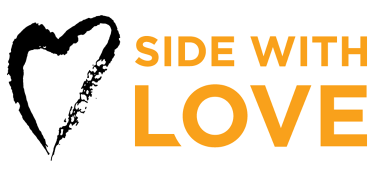
Immigration Action Coalition
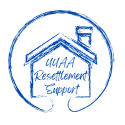 Family Resettlement Support
Family Resettlement Support
What’s new with the project? I see there is a name change!
- UUAA is officially approved to be a co-sponsor with Jewish Family Services to help resettle a refugee family! The tentative plan was to be matched with one of the Afghan families that would be arriving before February 14th, 2022. JFS expected to have one last surge, but truly only learns who will be arriving a few days ahead of time. Fortunately for the Afghan families, all co-sponsor eligible families were placed before UUAA was matched.
- What does this mean for us now? JFS has resettled an unprecedented number of families this year. Their cases workers are over capacity caring for the Afghans in their care and have families from other countries starting to arrive soon. We always knew this was a possibility and have chosen to move forward. We will accept being matched with a family from anywhere in the world. After all, why would it matter where they are from?
- We could be matched with a family by early March, so our preparations continue! See below about how to help. Check out our new Sign Up Genius to contribute to household items: https://uuaa.org/hwgs.
BACKGROUND INFO
What is this all about?
- UUAA is working with Jewish Family Services (“JFS”) to “Co-sponsor” a displaced family from abroad and resettle them here in our community. JFS and other resettlement agencies are operating beyond capacity and need community groups to step up and assist.
What is this all about?
- UUAA is working with Jewish Family Services (“JFS”) to “Co-sponsor” a displaced family from abroad and resettle them here in our community. JFS and other resettlement agencies are operating beyond capacity and need community groups to step up and assist.
What does “Co-sponsorship” entail?
- Co-sponsorship means helping the family get resettled. UUAA Volunteers will support them by helping find housing, healthcare, employment, education resources, transportation, etc and partially financing their living expenses for some time. They will not live at the church. The goal is to help the family become self-sufficient in six months to one year.
Tell me more about the family.
- We have not been assigned a family yet. It is very likely that we will not have any information about them until just a few days before they arrive. However, we expect the family to include 2-5 individuals.
What now? How can I help?
- UUAA’s Immigration Action Coalition is leading the organization of this effort. We need to show JFS we have enough support. Our goal is to have 40 volunteers who can contribute 1-2 hours per week (more at the beginning), and to raise at least $20,000.00. Our support will be in highest demand when the family first arrives and taper off as they gain independence and community support.
- Sign up to volunteer here.
- Donate to the Family Resettlement Fund on realm or here.
IMMIGRATION ACTION COALITION - WHO WE ARE
The Immigration Action Coalition (IAC) was formed in 2014 in response to the 150th Anniversary Service, “Welcoming the Stranger.”
We meet via Zoom on the second Saturday of each month from 10:00 -11:30am. Email This email address is being protected from spambots. You need JavaScript enabled to view it. for more information or to request the zoom link for our next meeting.
PURPOSE
We the members of the Immigration Action Coalition covenant to work together to educate ourselves and others about immigration issues; to advocate for immigration policy reform; and to act in support of justice for our immigrant community. We pledge our energies and our resources to creating a world where the inherent worth and dignity of every person, regardless of immigration status, is respected and all are welcomed. We will follow the lead of the immigrant community in prioritizing actions and will collaborate with other community organizations working for immigration rights.
COVENANT
In carrying out the work of the Immigration Action Coalition we agree to respect each other and to listen when others speak. We acknowledge that although mistakes will be made, our joint intentions are good. We agree to hold sensitive information, both personal and case-related, in
confidence among us. We agree to express our discomforts and disagreements promptly and thoughtfully, and we will support, inform, and guide each other with kindness and love.
Since 2014, the Immigration Action Coalition has been advocating, locally and nationally, for immigration reform. We also support our local immigrant community with direct actions including financial assistance, demonstration participation and volunteering/participating in various organizations including Washtenaw Interfaith Coalition for Immigration Rights, Washtenaw Congregational Sanctuary, Interfaith Coalition for Peace and Justice, Cosecha, and the Washtenaw ID Project.
Pandemic Era Fundraiser! Virtual Drag Bingo!
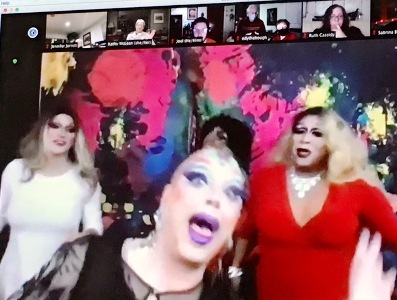
On March 6, 2021 the Immigration Action Coalition of UUAA in collaboration with Washtenaw Interfaith Coalition for Immigrant Rights (WICIR) and Mexiquenses hosted a unique virtual experience and raised funds for families in our community. In addition to a fun time and good spirits, the event raised over $2,185 to be distributed directly to immigrant families in Washtenaw County. These funds will help with emergency needs such as housing and utilities for families ineligible for government provided pandemic relief funds. Thank you to everyone who supported this effort!
May, 2020 Book Discussion with Author Bill Lopez - Separated
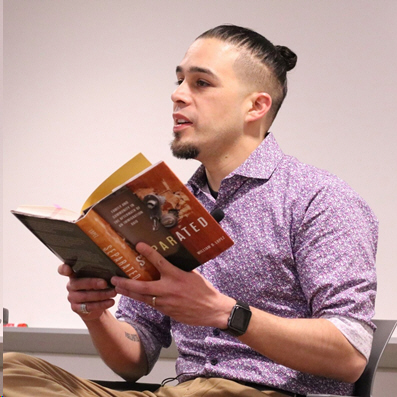
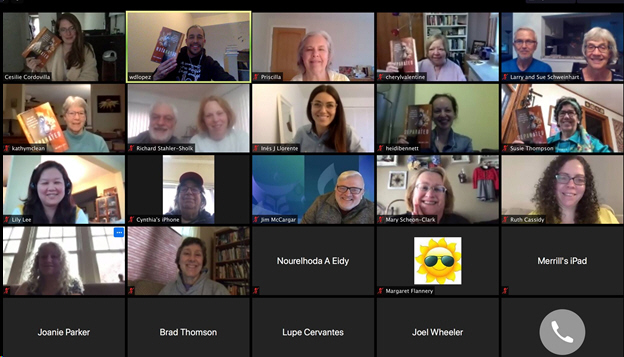
After the COVID-19 lockdown forced postponement, IAC scrambled to reschedule and successfully held a book discussion on May 17, 2020. The book discussion was on Separated by local scholar, Bill Lopez. Around 40 individuals participated.
Butterfly Project - January, 2020
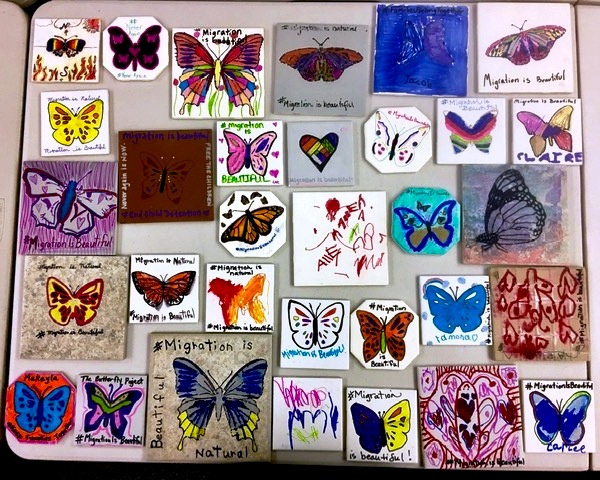
UUAA congregants are taking part in a local immigration awareness Butterfly Project. Tiles made for the Butterfly Project are placed in various locations in the Ann Arbor area. Follow this link to see the tiles and where to find them-- including a downloadable map of the tile locations.
The Butterfly Project of the Ann Arbor Jewish Sanctuary and Immigration Group aims to bring attention to the children and adults currently held in detention in the United States as a result of U.S. government actions. Through public art, the project intends to raise awareness of the on-going violations of basic human rights occurring in this country.
To find out about making your own tile email This email address is being protected from spambots. You need JavaScript enabled to view it.
Border Delegations
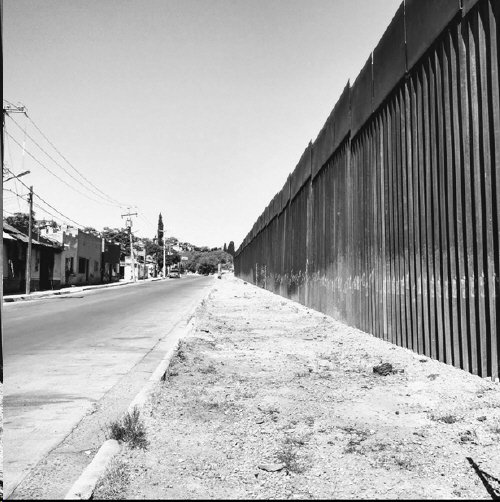
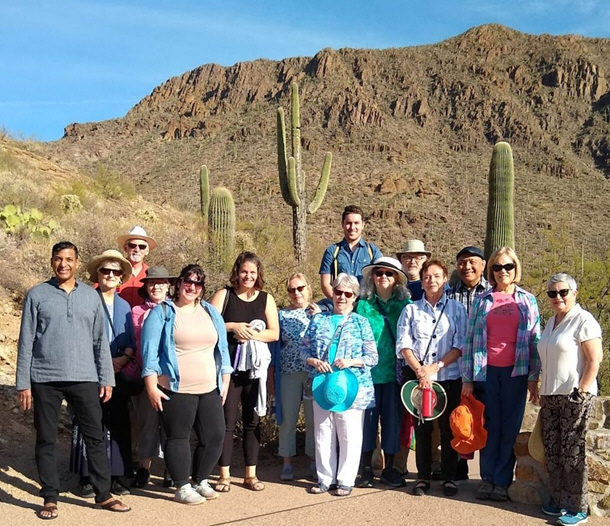
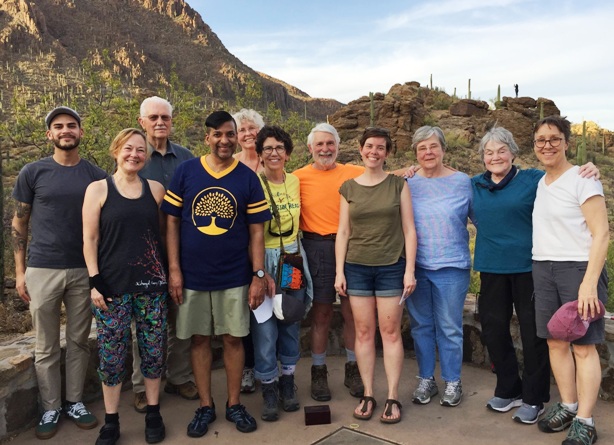
Two delegations from UUAA traveled to Arizona in 2019 to work with Borderlinks, an organization that offers experiential learning opportunities that explore the difficulties of migration and life along the U.S./Mexico border.
A third group had to cancel their travel to the border, but are continuing to participate in the preparation program as a way to learn more about immigration related issues. Borderlinks delegates have made presentations to the congregation and are now members of IAC and other UUAA Social Justice groups.
Other Recent Work
- In May 2020, a community member was released on bond on the condition that she quarantine in the state before being reunited with her family. IAC was able to finance her stay at an extended stay hotel, while members also provided some necessities and supported the individual during her stay.
- In April 2020, IAC donated $14,000 to WICIR’s fund to support our immigrant community. WICIR provided two checks to families who were experiencing financial hardship, many who did not receive any stimulus money and were unable to obtain other benefits.
- In December 2019, IAC presented the film Who is Dayani Cristol? to the congregation. 32 people attended the film and had an in-depth conversation about topics surrounding the life and death issues of migrants crossing our southern borderlands.
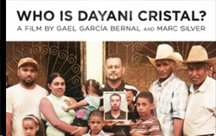
- Earlier in 2019, we organized a fundraiser for WICIR (Washtenaw Interfaith Coalition for Immigrant Rights) called “Salsa and Salsa” that raised $1,200 to go toward their efforts.
- In winter 2019, IAC led UUAA in requesting bond for an individual who was suffering from mental health issues in Calhoun County Jail as an immigration detainee. Members of the church attended the bond hearing, prevailed, and ultimately housed the individual in the church for nearly a month before she could be reunited with her family in the southern part of the country.
- In January, 2019 IAC gathered 245 coats to send to El Paso where hundreds of immigrants had been dropped off at shelters in the snow on Christmas Day. There was a coat shortage and IAC responded promptly and arranged for shipment.
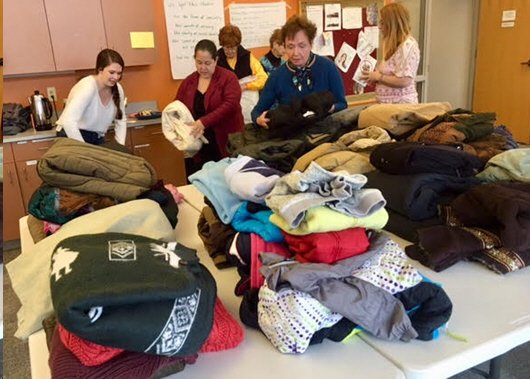
We Are Operating Virtually
Find Our Agendas, Minutes, Etc Here: https://www.dropbox.com/home/Immigration%20Action%20Coalition%20-%20UUAA
Washtenaw County Sanctuary
Nov 4, 2018 University of Michigan Employee Enters Sanctuary at Ann Arbor Friends Center
Mohamed Soumah, a custodian at the University of Michigan, took sanctuary at the Ann Arbor Friends Meeting House in November, 2018. He is afraid that if he is deported back to West Africa he will die of the kidney disease that forces him to get regular dialysis treatments. The dialysis treatments in Guinea are expensive and unreliable. Soumah came to the U.S. in 2003, married a U.S. citizen and has two sons, ages 11 and 10. Since divorcing, he's had to get a yearly work visa, and for seven years, it had been approved until now. He was to be deported back to Guinea-Conakry in West Africa on Oct. 19, but he ended up in the hospital. His social worker called the Washtenaw County Interfaith Coalition for Immigrant Rights and the Quakers offered him sanctuary. Soumah's recent appeal for a stay of removal was denied by ICE. He's asking for another but hasn't heard anything. Until he does, the Ann Arbor Friends Meeting House will be his home.
For more information on how you could be of help follow this link to the web site for the Interfaith Council for Peace and Justice.
Or you can read the coverage by Michigan Radio with this link.
February 14, 2018 Press Conference
The Washtenaw Congregational Sanctuary campaign held a press conference on Wednesday, Feb. 14, to announce the most recent commitments from congregations supporting the sanctuary movement. The conference was held at UUAA and included statements from area ministers about their commitment to sanctuary. Links to press coverage are included below.
Read the coverage on MLive.com
Which includes this video of Washtenaw County religious leaders speaking in support of the sanctuary movement:
Coverage by WDIV - ClickonDetroit (Story is at about minute 26:00)
Our Path to Becoming a Sanctuary Congregation
On Sunday, October 22, 2017, our congregation voted to become a level 1 hosting sanctuary congregation, volunteering to shelter immigrants who receive deportation orders but need more time to get their status re-evaluated. The IAC worked with many other groups to plan for this program that puts our values in action.
The resolution reads:
We, the members of the First Unitarian Universalist Congregation of Ann Arbor, believing in the worth and dignity of every person and the importance of compassion in human interactions, do hereby resolve to become a Sanctuary Congregation.
We are ready and willing to physically host an individual or family in imminent danger of unjust detainment and deportation until their legal options are carried out.
We will not do this work alone. We will join congregations across the country that have declared themselves Sanctuary Congregations, and will work with local congregations through Washtenaw Congregational Sanctuary to support, advocate for, and contribute to the safety and well-being of individuals or families in Washtenaw County who are invited into sanctuary.
(The resolution passed by 98% of the members who attended the October 22, 2017 Special Congregational Meeting.)
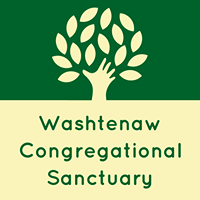 The Immigration Action Coalition partners with organizations already working in our community such as the Washtenaw Interfaith Coalition for Immigrant Rights (WICIR), Casa Latina, and the Washtenaw ID Project. If you are interested in joining us, please send your name and contact information to This email address is being protected from spambots. You need JavaScript enabled to view it.. Co-Chairs of the Immigration Action Coalition are: Cheryl Valentine, Vicki Echegoyen and Louise Kazarinoff
The Immigration Action Coalition partners with organizations already working in our community such as the Washtenaw Interfaith Coalition for Immigrant Rights (WICIR), Casa Latina, and the Washtenaw ID Project. If you are interested in joining us, please send your name and contact information to This email address is being protected from spambots. You need JavaScript enabled to view it.. Co-Chairs of the Immigration Action Coalition are: Cheryl Valentine, Vicki Echegoyen and Louise Kazarinoff
Sanctuary Background Information
To download or read a FAQ sheet about Sanctuary, click here
To listen to the Special Congregational Meeting held October 22nd, 2017 to vote on the sanctuary resolution:
To listen to the Town Hall Meeting held October 8, 2017, in preparation for the congregational vote on Sanctuary.
Click here for Part 1
Click here for Part 2
How our congregation prepared for becoming a Sanctuary Congregation:
- The UUAA Board of Trustees voted in March, 2017 to support becoming a sanctuary congregation and to bring the resolution to become a host congregation to a vote of the entire congregation.
- Working with Washtenaw Congregational Sanctuary. The UUAA Immigration Action Coalition (IAC) together with WICIR (Washtenaw Interfaith Coalition for Immigrant Rights) and ICPJ (Interfaith Council for Peace and Justice) formed Washtenaw Congregational Sanctuary last January. WCS is an interfaith coalition pledged to support any congregation in Washtenaw County who takes in a sanctuary guest. UUAA members Cheryl Valentine, Ruth Cassidy, and Melanie Hagen are on the WCS Steering Committee. (icpj.org/wcs)
- Education. The IAC has spearheaded the efforts for UUAA to become a sanctuary congregation offering twenty educational opportunities in the past two years for our congregants to learn about immigration and sanctuary issues.
- Exploring impacts of sanctuary on UUAA. The UUAA Sanctuary Task Force (Rev. Doug Wadkins, Rev. Lindasusan Ulrich, Ed Lynn, Debby Casamatta, Laura Bolletino, and Cheryl Valentine) researched liability, legal and financial issues, located a workable and welcoming space (the Marley Room), talked with other sanctuary congregations, and discussed sanctuary with our staff.
- Preparing for emergencies. The Sanctuary Task Force prepared an emergency protocol so staff, volunteers, and sanctuary guests will know just what to do in case of an emergency.
For more information on IAC contact This email address is being protected from spambots. You need JavaScript enabled to view it. .
Challenging Racism
Link to UUAA Multi-Cultural Outreach
Unitarian Universalist (UU) Racial Justice
History of UU Involvement in Anti-Racism
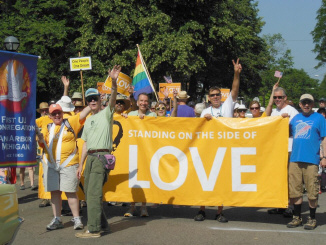
Challenging Racism supports members of this Congregation in their journey toward spiritual growth and self-knowledge about their own racial, ethnic, and class privilege. We present programs that affirm the worth and dignity of all and build meaningful connections with others on this journey. Our evolving mission is to assist UUAA by engaging in conversations about race, ethnicity, and class; and to provide opportunities for reflection and action.
Currently the Challenging Racism Group is engaged in conversation about how UUAA should begin living into our Congregational Vision. Throughout the Vision 20/50 process, the congregation expressed deep concern about the existence and impact of racism. This concern has been heightened by
the recent rise in racist, anti-Semitic, Islamophobic and anti-immigrant incidents, actions in opposition to the inherent worth and dignity of all that we affirm in our UU principles.
To join this group, and take part in learning about and actively dismantling institutional and systemic racism, please send an email to This email address is being protected from spambots. You need JavaScript enabled to view it.. You may use the same email address to share your ideas and what inspires you to this challenging work. Thank you!
To keep up through Facebook, go to UUAA CRG on Facebook.
We acknowledge The First Unitarian Universalist Congregation of Ann Arbor sits on the original homelands of the Council of the Three Fires, the Ojibwe (Chippewa), Odawa (Ottowa), and Potawatomi Tribes. Today, Indigenous peoples throughout Michigan continue to protect and remain in relationship with the land of their ancestors and will do so until the end of time. We honor these beginnings and recognize the ongoing dedication and importance of Indigenous culture within our communities and within the land that we gather, live, learn and work on. (Indigenous History of the Council is below.)
**June 12th 2020 - A Letter to the UUAA Congregation (Full Racial Justice Statement here)
"It is with profound heartache that we recognize that our nation, and our broader world, is at an inflection point related to the pernicious harm of individual and systemic racism....We recognize, in our heartache, that the dream of that civil rights movement was never fully realized...Racism was not built in a moment....We support and affirm that impulse toward building the world we need, as has our congregation: UUAA’s visioning process has lifted up our collective commitment to racial justice as one of our congregation’s core priorities....We pledge our leadership to the long haul work that is needed, and invite you into that work with us. It will take all of us. Black Lives Matter - to each of us personally, to our families, and to our entire UUAA community.
In love, faith, and solidarity in that shared commitment to justice,
Mr. Erik Stalhandske, President
Rev. Manish Mishra-Marzetti, Senior Minister
Ms. Quiana Perkins, Coordinator of Social Justice and Pastoral Care
===========
... Indigenous History of the Council of Three Fires ...
Originally one people, or a collection of closely related bands, the ethnic identities of Ojibwa, Ottawa, and Potawatomi developed after the Anishinaabe reached Michilimackinac on their journey westward from the Atlantic coast. Using the Midewiwin scrolls, Potawatomi elder Shup-Shewana dated the formation of the Council of Three Fires to 796 AD at Michilimackinac.
In this Council, the Ojibwe were addressed as the "Older Brother," the Odawa as the "Middle Brother," and the Potawatomi as the "Younger Brother." Consequently, whenever the three Anishinaabe nations are mentioned in this specific and consecutive order of Ojibwe, Odawa, and Potawatomi, it is an indicator implying Council of Three Fires as well. In addition, the Ojibwa are the "keepers of the faith," the Odawa are the "keepers of trade," and the Potawatomi are the designated "keepers/maintainers of/for the fire" (boodawaadam), which became the basis for their name Boodewaadamii (Ojibwe spelling) or Bodéwadmi (Potawatomi spelling).
Though the Three Fires had several meeting places, Michilimackinac became the preferred meeting place due to its central location. From this place, the Council met for military and political purposes. From this site, the Council maintained relations with fellow Anishinaabeg nations, the Ozaagii (Sac), Odagaamii (Meskwaki), Omanoominii (Menominee), Wiinibiigoo (Ho-Chunk), Naadawe (Iroquois Confederacy), Nii'inaawi-Naadawe (Wyandot), Naadawensiw (Sioux), Wemitigoozhi (France), Zhaaganaashi (England) and the Gichi-mookomaan (the United States).
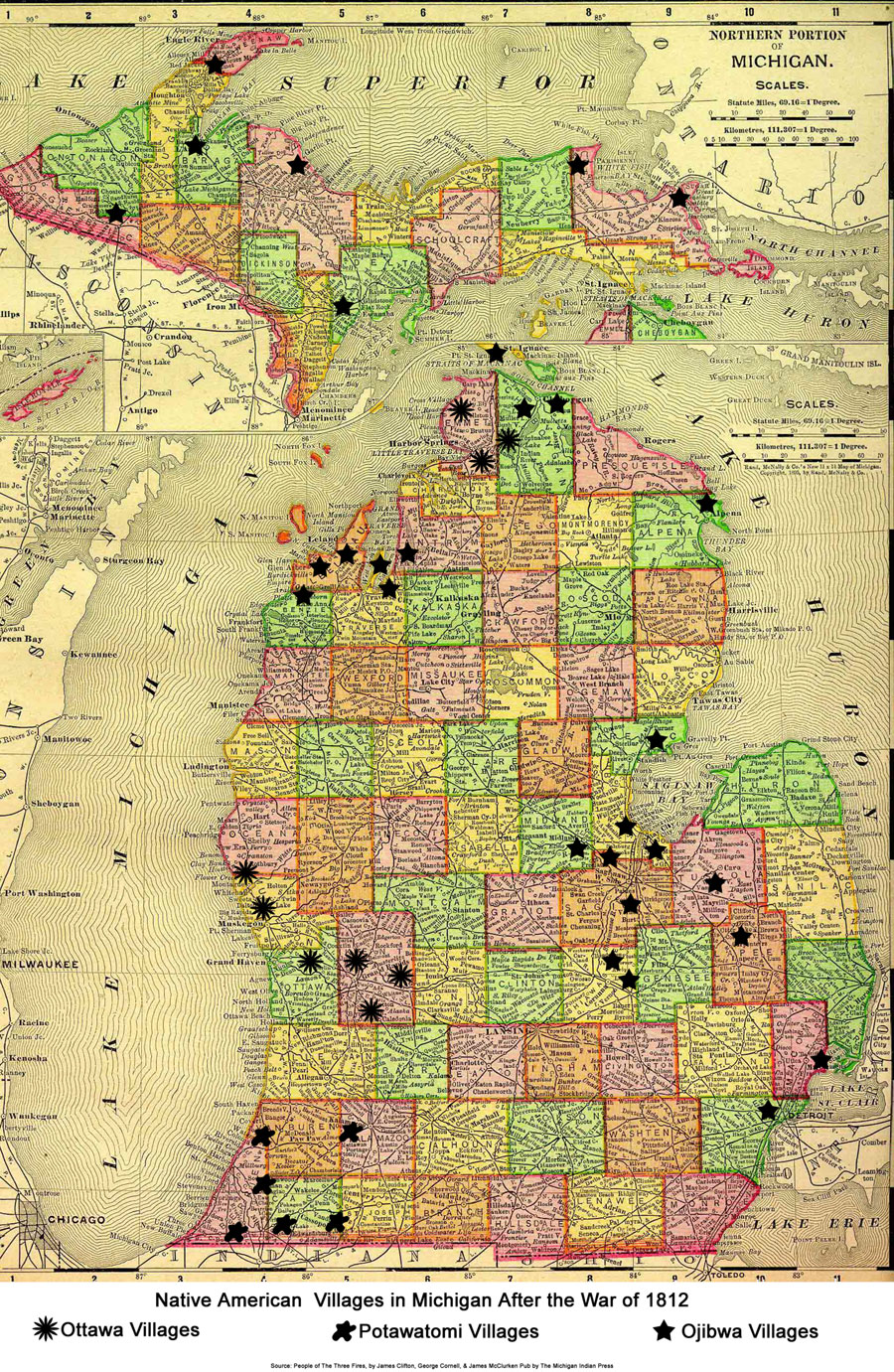
RECOMMENDED READING:
The Indigenous Peoples History of the United States by Roxanne Dunbar-Ortiz and published by Beacon Press.
Subcategories
Faith in Action Programs Article Count: 5
Social Justice Council Article Count: 1
Social Justice Main Page Article Count: 2
Community Donations Article Count: 1
UUs Beyond Our Congregation Article Count: 1
Environmental Action Article Count: 8
Mindful Eating Article Count: 21
Habitat for Humanity Article Count: 1
AAUUJME Article Count: 1
Religious Action for Affordable Housing (RAAH) Article Count: 1
UU Service Committee Community Coffee Project Article Count: 1
Khasi Hills Article Count: 1
Partner Church in Romania Article Count: 4
Interfaith Council for Peace & Justice Article Count: 1
Reproductive Rights Article Count: 1
Prison Books Article Count: 1
Michigan Prison Reentry Initiative (MPRI) Article Count: 1
Jackson Social Welfare Fund Article Count: 1
Sharing the Collection Article Count: 2
On the first Sunday of each month, our collection is donated to nonprofit community service organizations in the furtherance of their important work.

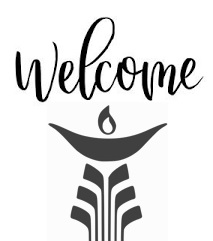 NEW TO UUAA?
NEW TO UUAA?